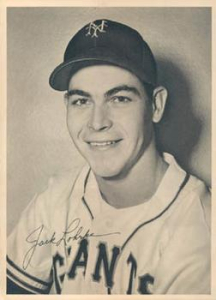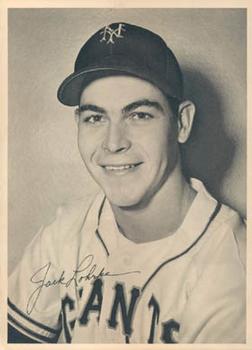September 1, 1947: Jack Lohrke hits New York Giants’ record-setting 183rd home run of season
 On June 24, 1946, the Spokane Indians, a Class B Western International League team full of World War II veterans and promising prospects, traveled by bus across Washington state for their next series in Bremerton. While the team stopped for dinner in Ellensburg, word came that third baseman Jack Lohrke had been recalled by the San Diego Padres, the Pacific Coast League team that owned his contract. Lohrke said goodbye to his teammates and bummed a ride back to Spokane to gather his belongings.
On June 24, 1946, the Spokane Indians, a Class B Western International League team full of World War II veterans and promising prospects, traveled by bus across Washington state for their next series in Bremerton. While the team stopped for dinner in Ellensburg, word came that third baseman Jack Lohrke had been recalled by the San Diego Padres, the Pacific Coast League team that owned his contract. Lohrke said goodbye to his teammates and bummed a ride back to Spokane to gather his belongings.
An hour later, the team bus hurtled 300 feet down a steep ravine near Snoqualmie Pass, killing nine of the 15 players on board.
It was not Lohrke’s first close call with mortality. He fought in the European Theater during World War II, including the Battle of the Bulge. Upon his return to the United States, he was bumped off a military plane that crashed after refueling near Kansas City. After the Spokane Indians tragedy—to this day the deadliest accident in American professional sports—Lohrke was tagged with the nickname Lucky, a moniker that stuck with him for the rest of his career.
Lohrke’s stellar play with the Padres attracted the attention of the Boston Braves, who agreed to send Johnny Barrett, three other players, and $50,000 to San Diego for the rights to Lohrke the following spring.1 The agreement fell through, however, because of what the Boston Globe described at the time as “a slip up in the Commissioner’s office.”2 Decades later, Padres owner Bill Starr explained that the Braves failed to obtain waivers on three unnamed players in the allotted amount of time. Lohrke was up for grabs in the postseason Rule 5 draft, where the New York Giants snagged him at a cost of $10,000. Starr called the ordeal one of the saddest experiences of his baseball career.3
The 1946 Giants belted a league-high 121 home runs but finished at the bottom of the NL standings in part because of a pitching staff that posted a 3.92 ERA—a half-run over the league average. The Giants’ most prolific slugger, first baseman Johnny Mize, led the team with 22 home runs despite being limited to 101 games because of injuries. All-Star catcher Walker Cooper missed time because of a broken finger and leg infection and hit eight round-trippers.4 Outfielder Willard Marshall returned after three years of military service and slugged 13 homers. Like many players who missed time during the war, Cooper and Marshall were not in top physical condition and were working their way back to baseball shape.
As a rookie in 1947, Lohrke earned the Giants’ starting third-base job and hit eighth in manager Mel Ott’s lineup. Three members of the regular starting nine—Mize, Marshall, and Cooper—all had large spikes in their home-run totals. Rookie outfielder Bobby Thomson contributed 29 homers. At season’s end, the foursome ranked first, third, fourth, and fifth on the National League home run leaderboard.5 Lohrke, Sid Gordon, and Bill Rigney all added double-figure round-tripper totals. Club secretary Eddie Brannick coined the nickname “The Windowbreakers” as an ode to the team’s penchant for the long ball.6
On August 31 against the Dodgers, Marshall hit the Giants’ 182nd home run of the season, tying the 1936 New York Yankees’ major-league record. With a month left in the season, it was not a question of if the Giants would break the mark but by how much. The abundance of homers excited the fan base and led to a franchise attendance record but failed to translate into pennant contention. At the end of August, the Giants’ 64-62 record was good for fourth place in the NL—15½ games behind the league-leading Brooklyn Dodgers. The Giants were held back by mediocre pitching and lackluster defense that committed a league-high 155 errors.
On September 1, the Giants hosted the third-place Boston Braves (73-58) at the Polo Grounds for a Labor Day afternoon doubleheader. A crowd of 43,106 gathered for a matchup of young aces in the first game. Southpaw Warren Spahn (16-9, 2.69 ERA) took the mound for the Braves in opposition to rookie righty Larry Jansen (16-4, 3.38), who had won his previous nine decisions and entered the contest a perfect 4-0 against Boston for the season.
Jansen and Spahn each faced the minimum through three innings. The lone safety in that span, a first-inning single by Giants shortstop Buddy Kerr, was erased on an inning-ending double play.
Neither team registered another hit until Cooper tripled to start the home half of the fifth. Spahn retired Gordon on a comebacker for the first out, then pitched around Lloyd Gearhart, resulting in a walk that set up a potential double play.
Spahn got the groundball he desired from the next man up, Lohrke. Third baseman Bob Elliott fielded the bouncer and threw to second to force Gearhart. Lohrke, who had good speed, beat second baseman Connie Ryan’s relay to first “by an eyelash” as Cooper crossed the plate with the game’s first run.7
According to Jim McCulley of the New York Daily News, Jansen dotted the corners with his curveball and had more zip on his fastball than usual, resulting in five frames of hitless ball.8 Spahn got the Braves’ first hit with a one-out single up the middle in the sixth, but Jansen disposed of Tommy Holmes and Johnny Hopp to end the inning.
Jansen retired the Braves in order in the seventh before the Braves finally got a man in scoring position on Ryan’s double off the left-field wall to start the eighth. After Jansen struck out pinch-hitter Earl Torgeson, catcher Phil Masi, who had replaced Hank Camelli in the seventh, hit a dribbler down the third-base line that eluded Jansen for an infield single.9
With runners on the corners and Spahn due up, Braves manager Billy Southworth lifted his ace for pinch-hitter Mike McCormick, who stroked a game-tying single to center field. Jansen kept the score even by getting Holmes to ground into a 6-3 double play.
Still tied 1-1 heading to the bottom of the eighth, Southworth brought in righty Red Barrett, who had tossed a complete game against the Phillies only two days earlier. Lohrke led off for New York and redirected Barrett’s first offering into the upper tier of the left-field stands. The blast, Lohrke’s sixth of the season, was a no-doubter. The destination of the ball “was easily determined before it had gone more than a dozen feet,” according to one account.10
Lohrke’s record-breaking home run proved to be the deciding tally. Jansen quietly set down the heart of the Braves’ order in the ninth to secure a 2-1 triumph, his 17th win and 16th complete game of the season. He ended the season with a 21-5 mark for a league-best .808 winning percentage and finished second in the NL Rookie of the Year Award voting behind Jackie Robinson.
The Giants clobbered the Braves, 12-2, in the nightcap behind a complete-game effort from Ray Poat. Lohrke went 2-for-3 with a pair of walks in the contest and slammed his second homer of the day.
The Polo Grounders finished the 1947 campaign with 221 home runs, setting a new standard by a wide margin. The seven other NL teams averaged 95. The Giants’ total was not equaled until the Cincinnati Reds clouted 221 in 1956, and was not topped until the Roger Maris and Mickey Mantle-led Yankees walloped 240 in 1961.11
The 11 homers Lohrke hit in 1947 accounted for half of his major-league career total. When Leo Durocher took over as the Giants’ skipper the following season, Lohrke was relegated to a utility role. After five seasons in New York, he spent two seasons riding the pine with the Philadelphia Phillies before finishing his playing career with another half-dozen minor-league seasons, including five in the Pacific Coast League.
Lohrke, who was reticent by nature, shied away from the alliterative nickname that served as a constant reminder of his friends who perished in the Spokane Indians bus tragedy. Nevertheless, the name stuck with him. Newspapers routinely referred to him as Lucky Lohrke, as did The Baseball Encyclopedia when it was first published in 1969.
“Nobody outside of baseball calls me Lucky Lohrke these days,” Lohrke told Sports Illustrated in 1994. “I may have been lucky, but the name is Jack. Jack Lohrke.”12
Acknowledgments
This article was fact-checked by Ray Danner and copy-edited by Len Levin.
Sources
In addition to the sources mentioned in the Notes, the author consulted Baseball-Reference.com, Retrosheet.org, and SABR.org.
https://www.baseball-reference.com/boxes/NY1/NY1194709011.shtml
https://www.retrosheet.org/boxesetc/1947/B09011NY11947.htm
Notes
1 Bob Wolf, “Mr. Lucky,” Los Angeles Times, June 27, 1990: 200.
2 Hy Hurwitz, “Braves Give Johnny Barrett to Padres for Lohrke—the Man They Didn’t Get,” Boston Globe, December 9, 1946: 6.
3 Wolf, “Mr. Lucky.”
4 C. Paul Rogers III, “Walker Cooper,” SABR BioProject, accessed November 5, 2023, https://sabr.org/bioproj/person/walker-cooper/.
5 Mize (51), Marshall (36), and Cooper (35) all hit career highs in home runs in 1947.
6 Steve Treder, “The Windowbreakers: The New York Giants in 1947,” The National Pastime, Vol. 26 (Cleveland, OH: SABR, 2006).
7 Hy Hurwitz, “N.Y. Pushes Team H.R. Mark to 185; Jansen Wins 17th,” Boston Globe, September 2, 1947: 6.
8 Jim McCulley, “Giants Conquer Braves, 2-1, 12-2, Top HR Mark,” New York Daily News, September 2, 1947: 327.
9 Hurwitz, “N.Y. Pushes Team H.R. Mark to 185; Jansen Wins 17th.”
10 McCulley, “Giants Conquer Braves, 2-1, 12-2, Top HR Mark.”
11 The 2019 Minnesota Twins and 2023 Atlanta Braves share the current record of 307 home runs.
12 Ron Fimrite, “O Lucky Man,” Sports Illustrated, November 14, 1994, https://vault.si.com/vault/1994/11/14/o-lucky-man-a-twist-of-fate-saved-jack-lohrke-from-the-worst-tragedy-in-minor-league-history. Lohrke died in 2009 at the age of 85.
Additional Stats
New York Giants 2
Boston Braves 1
Game 1, DH
Polo Grounds
New York, NY
Box Score + PBP:
Corrections? Additions?
If you can help us improve this game story, contact us.


